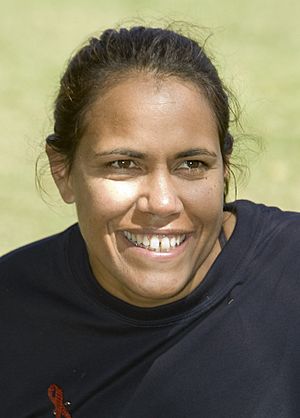National Aboriginal and Torres Strait Islander Sports Awards facts for kids
The National Aboriginal and Torres Strait Islander Sports Awards were special events held to celebrate the amazing achievements of Aboriginal and Torres Strait Islander athletes. These awards started in 1986 and aimed to show how much these athletes have contributed to sports in Australia and around the world. The last awards were held in 2003.
Contents
About the Awards
The very first National Aboriginal and Torres Strait Islander Sports Awards took place in Adelaide on 6 September 1986. The idea behind these awards was to honor the many Aboriginal men and women who had excelled in sports. Charlie Perkins, who worked for the government, strongly supported the awards and helped get money from the Australian Government to start them. Later, the Aboriginal and Torres Strait Islander Commission continued to provide funding. Australian businesses also helped out with sponsorship.
Sydney Jackson, a famous Australian rules football player and sports leader, said that these awards were the most exciting thing that has happened in Aboriginal sport outside individual achievement. He also believed that recognizing Aboriginal sportspeople would go a long way towards encouraging young Aboriginal athletes to preserve in the development of their natural talents. Clyde Holding, the Minister for Aboriginal Affairs at the time, said at the first awards that formal recognition of the big contribution made to Australian sport by Aboriginals is long overdue.
The first awards were planned to be a big, exciting event, similar to other major sports awards. Because of the costs, it was suggested that the awards be held every two years. Until 2003, the awards ceremonies were shown on TV by either SBS or the ABC. These events often included performances by talented Aboriginal artists, like David Gulpilil who danced at the first awards.
Where and When They Were Held
| No! | Date | Location |
|---|---|---|
| 1st | 6 September 1986 | Adelaide, South Australia |
| 2nd | 12 November 1988 | Brisbane , Queensland |
| 3rd | 25 October 1991 | Sydney, New South Wales |
| 4th | 3 November 1993 | Melbourne, Victoria |
| 5th | 30 June 1995 | Darwin, Northern Territory |
| 6th | 16 October 1997 | Perth, Western Australia |
| 7th | 16 October 1999 | Hobart, Tasmania |
| 8th | 9 November 2001 | Sydney, New South Wales |
| 9th | 7 November 2003 | Adelaide, South Australia |
Award Winners
1st Awards: 1986
The first awards celebrated many past Aboriginal athletes. People said that never before had so many Aboriginal sporting champions congregated in one place. At this event, tennis legend Evonne Goolagong Cawley received a special medal from the Sport Australia Hall of Fame. She joined Lionel Rose and Polly Farmer as the only Aboriginal members of the Hall of Fame in 1986.
- National Sportswomen - Evonne Goolagong Cawley (Tennis)
- National Sportsman - Lionel Rose (Boxing)
- National Junior Sportswomen - Treahna Hamm (Judo)
- National Junior Sportsman - David Ross (AFL)
2nd Awards: 1988
- National Sportswomen - Cheryl Drayton (Badminton)
- National Sportsman - Tony Jones (Boxing)
- National Junior Sportswomen - Majorie Patrick (Vision impaired Swimming/Athletics)
- National Junior Sportsman - Darryl Hiles (Boxing)
3rd Awards: 1991
- National Sportswomen - Cathy Freeman (Athletics)
- National Sportsman - Karl Feifar (Paralympic Athletics)
- National Junior Sportswomen - Toni Gableish
- National Junior Sportsman - Matthew AhMat (AFL)
4th Awards: 1993
- National Sportswomen - Donna Burns (Paralympic Basketball)
- National Sportsman - Gavin Wanganeen (AFL)
- National Junior Sportswomen - Syripa Macer (Judo)
- National Junior Sportsman - Lachlan Wright (Soccer, Rugby league, Surf life saving)
5th Awards: 1995
- National Sportswomen - Cathy Freeman (Athletics)
- National Sportsman - Kyle Vander-Kuyp (Athletics)
- National Junior Sportswomen - Helena Saunders (Netball)
- National Junior Sportsman - Joshua Ugle (Karate and Badminton)
6th Awards: 1997
- National Sportswomen - Cathy Freeman (Athletics)
- National Sportsman - Baeden Choppy (Field hockey)
- National Junior Sportswomen - Rohanee Cox (Basketball)
- National Junior Sportsman - Anthony Martin (Weightlifting)
- National Disabled Sportswoman of the Year - Syripa Macer (Karate)
- National Disabled Sportsman of the Year - Lee Towers (Basketball)
- Special Tribute Award - Charlie Perkins (for his work in sports administration and as a soccer player)
7th Awards: 1999
- National Sportswomen - Cathy Freeman (Athletics)
- National Sportsman - Nicky Winmar (AFL) / Cliff Lyons (Rugby league)
- National Junior Sportswomen - Kelly Denner (Swimming)
- National Junior Sportsman - Ashley Anderson (Swimming)
- National Disabled Sportswoman of the Year - Beverley Champion (Athletics)
- National Disabled Sportsman of the Year - Ashley Pardon (Athletics)
- National Sports Writers Award - Lionel Rose (for his famous boxing victory in 1968)
- Outstanding Contributions by Older Persons - George Bracken and Faith Thomas
- Outstanding Contributions to Indigenous Sports - Danny Morseu and Andrea Collins
8th Awards: 2001
- National Sportswomen - Cathy Freeman (Athletics)
- National Sportsman - Jason Gillespie (Cricket) / Andrew McLeod (AFL)
- National Junior Sportswomen - Suellyn Hayes (Wrestling)
- National Junior Sportsman - Fred Agius (Soccer)
- National Disabled Sportswoman of the Year - Christine Maynard (Basketball)
- National Disabled Sportsman of the Year - Warren Lawton (Athletics)
- Dr Charles Perkins Award - Michael Long (AFL) / Anthony Mundine (Boxing)
9th Awards: 2003
- National Sportswomen - Bo De La Cruz (Touch football)
- National Sportsman - Anthony Mundine (Boxing)
- National Junior Sportswomen - Kathleen Logue (Darts)
- National Junior Sportsman - Kyle Anderson (Darts)
- National Disabled Sportswoman of the Year - Tegan Blanch (Tennis/Swimming/Athletics)
- National Disabled Sportsman of the Year - Troy Murphy (Ten pin bowling)
- Dr Charles Perkins Award - Cathy Freeman (Athletics) / Kyle Vander Kuyp (Athletics)
See also
 | Janet Taylor Pickett |
 | Synthia Saint James |
 | Howardena Pindell |
 | Faith Ringgold |


